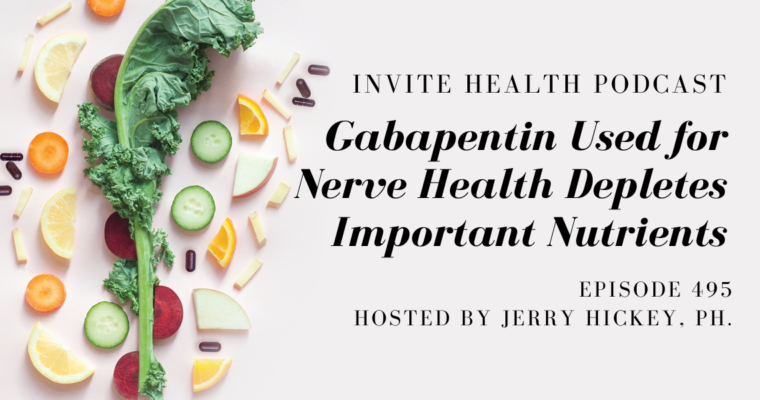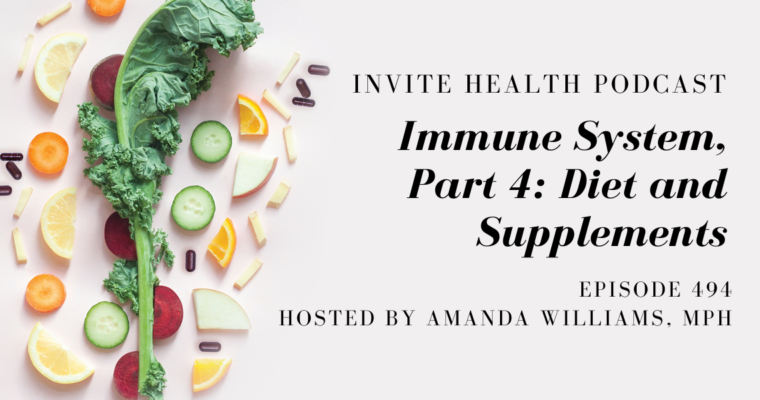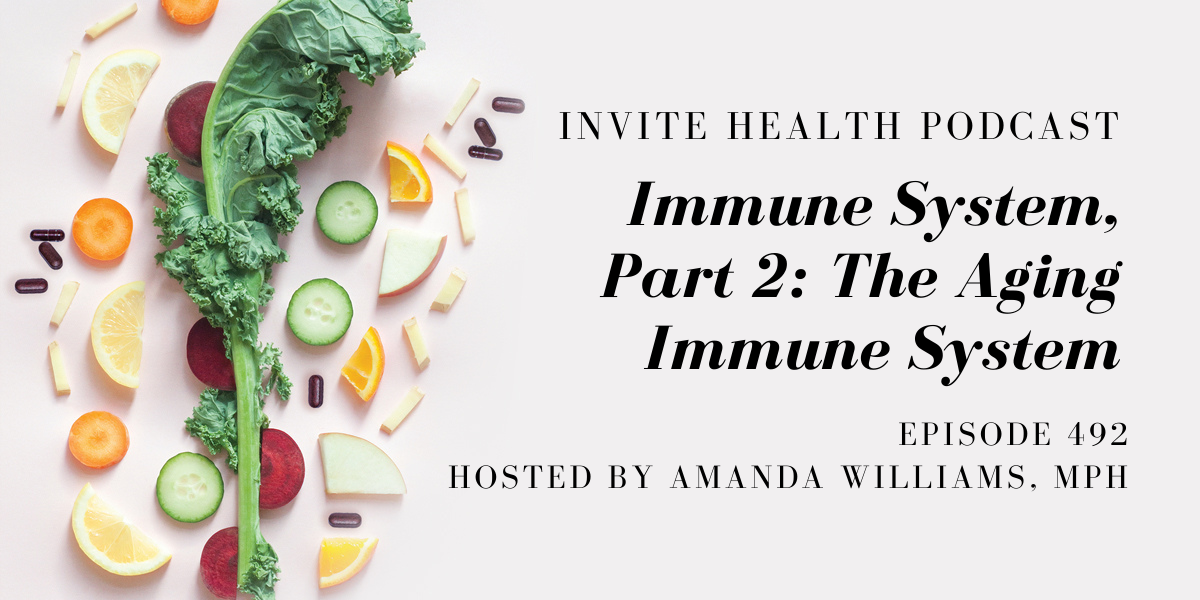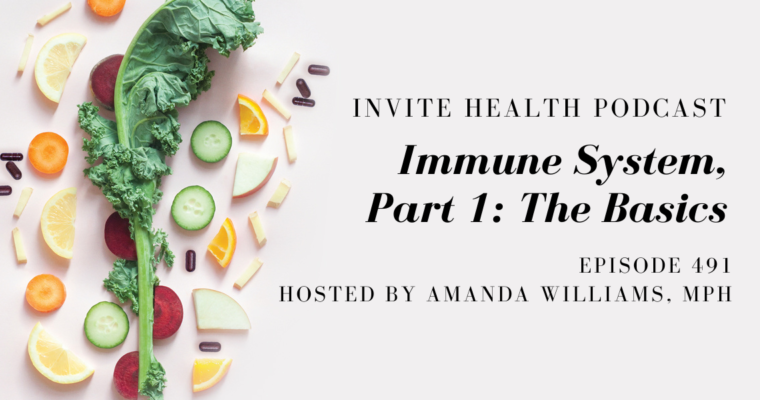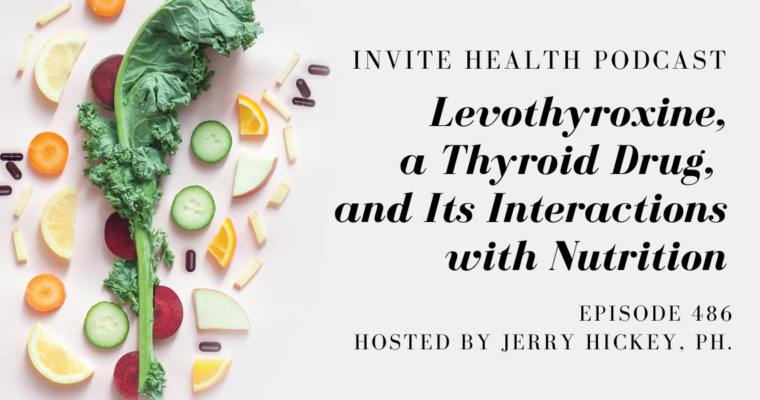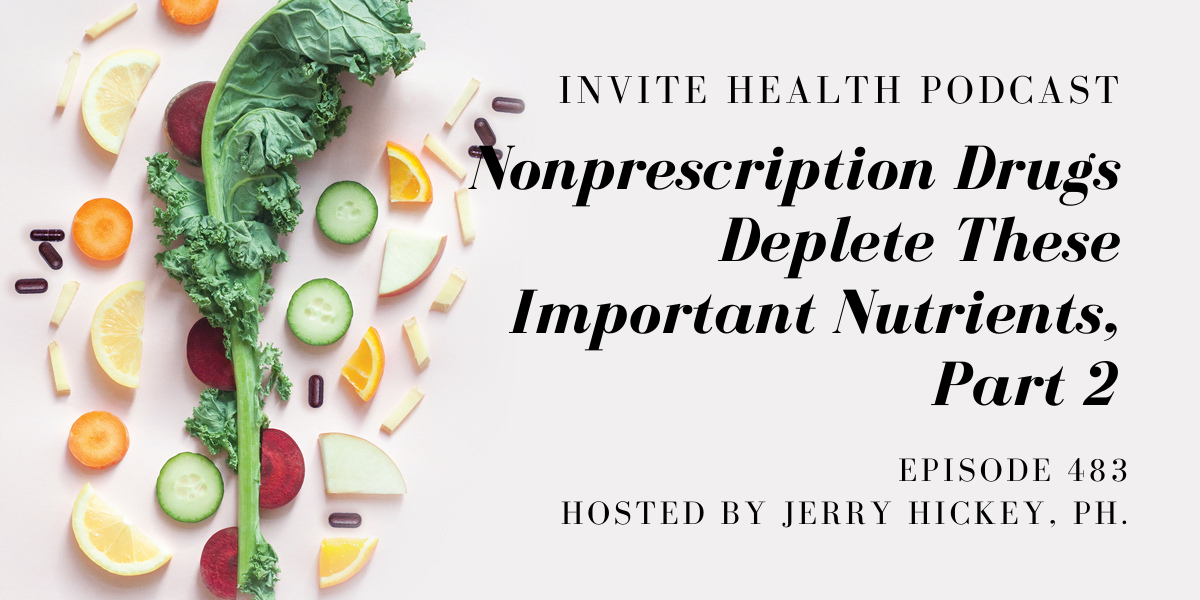nonprescription drugs nonprescription drugs nonprescription drugs nonprescription drugs nonprescription drugs nonprescription drugs nonprescription drugs nonprescription drugs nonprescription drugs nonprescription drugs nonprescription drugs nonprescription drugs
Subscribe Today!
Please see below for a complete transcript of this episode.
Nonprescription Drugs That Deplete Important Nutrients, Part 2 – InViteⓇ Health Podcast, Episode 483
Hosted by Jerry Hickey, Ph.
*Intro music*
InVite Health Podcast Intro: Welcome to the InViteⓇ Health Podcast, where our degreed healthcare professionals are excited to offer you the most important health and wellness information you need to make informed choices about your health. You can learn more about the products discussed in each of these episodes and all that InViteⓇ Health has to offer at www.invitehealth.com/podcast. First time customers can use promo code PODCAST at checkout for an additional 15% off your first purchase. Let’s get started!
*Intro music*
Jerry Hickey, Ph.: Many commonly used drugs deplete important nutrients and the important message is, even over-the-counter drugs can deplete important nutrients. Over-the-counter drugs are drugs that do not require a prescription. In episode five of our drug-nutrient depletement series, I discussed acetaminophen, you know, Tylenol, and the nutrients it depletes; antacids, such as Mylanta and Maalox, and the nutrients they deplete; aspirin and the nutrients they deplete. I also mentioned that we did an episode recently on NSAIDs, just on NSAIDs like ibuprofen and naproxen, which would be Advil and Aleve, and their issues, including the nutrients they deplete. And today we’re going to discuss two other important families of drugs that have important nutrient depletions.†
So welcome to episode six, Nonprescription Drugs That Deplete Important Nutrients. My name is Jerry Hickey and I’m a nutritional pharmacist. I’m also the Senior Scientific Officer over here at InViteⓇ Health. Now, thanks for tuning in today to the podcast. You can find all of our episodes for free, we have hundreds of them, wherever you listen to podcasts or just visit invitehealth.com/podcast. Please subscribe and leave us a review. You can also follow us on Twitter and Instagram and Metaverse, you know, Facebook. The information on this episode is linked at the episode description, so I’d like to get started.†
Let’s start off with laxatives. There are powerful laxatives, used to treat constipation, but also to clean out the bowels before like surgery. An example would be ex-lax, which is senna compounds, and more commonly used is bisacodyl. These are stimulant laxatives. They’re more powerful than the other laxatives. Other laxatives affect the environment of the intestines or affect the stool itself, making it more watery, etc., so it’s easier to pass. Stimulant laxatives actually work directly on the walls of the intestines. They stimulate evacuation. They stimulate the muscles to contract and get rid of whatever you need to get rid of. So they work quickly, they’re more powerful, they work directly on the walls of the intestines, so this can lead to certain side effects, like diarrhea, like an upset stomach and gassiness. Rectal irritation is not uncommon. They can also lead to dependence on laxatives. They’re more likely to do that than other laxatives.†
So we know that laxatives with bisacodyl deplete important minerals. That could be Feen-A-Mint; Carter’s Little Pills, that’s an old-time pharmacy product; Correctol; Dulcolax; PMS-Bisacodyl… so they deplete two really incredibly important minerals: calcium and potassium. Now, calcium is needed for regulating your heartbeat and your heart rate and your blood pressure. Calcium is needed for your muscles to work. One reason why your muscles spasm after intense exercise is cause the calcium was pumped out of them. Calcium is needed to release energy from sugar. Sugar is the main source of energy for the human body and the sugar’s converted into energy in these little vacuoles called mitochondria. They’re within your cells and calcium is at the core of that. These mitochondria cannot produce energy out of sugar if you lack calcium. And, of course, calcium’s needed for your bones.†
And then there’s potassium. It’s pretty easy to get potassium out of vegetables and fruits, so if you have three servings of vegetables every day and two servings of fruit, you’re getting a good amount of potassium. Most people don’t have three servings of vegetables and two servings of fruit every day. The last time I saw the figure from NHANES, which is a national survey that’s periodically performed by the United States government, only 2% of Americans were getting sufficient potassium from their food. So what happens if you lack potassium? The body uses potassium to regulate the pH of your blood, so pH is acid or base or in between, which is neutral. Base is kind of like the opposite of acid, so your blood is supposed to be slightly basic. Slightly not acidic. And if it becomes acidic, you develop ketoacidosis, which is also called lactic acidosis. You can go into a coma and the chances are highly unlikely that you come out of that coma cause your organs shut down, like your kidneys and your lungs and your heart. So, if you lack potassium, one thing that happens is your body has to borrow the minerals from your bones to keep the blood slightly alkaline, slightly basic. Alkaline and basic are the same thing. So to keep the blood slightly basic, the body will borrow minerals from the bone and you can have depletion of calcium and other minerals from the bone, so lacking potassium can lead to bone loss and weak bones, fragility of bones like osteopenia, osteoporosis. Now, all of these minerals have to go somewhere and if your blood is becoming a little acid, then chances are your urine is going to be more acidic. And what happens to minerals in an acid environment of the urine? They congeal into crystals and they create kidney stones. So if you lack potassium, you have a much higher risk of losing bone and you have a much higher risk of developing kidney stones, but you can also lose muscle, which is bad. You need muscle for survival. You need muscle so you don’t tip over and hit your head or your hip or something. Muscle declines and strength declines with age. It’s a natural process but it’s a horrible process. Nobody wants it. It’s called sarcopenia. So if you have an acid environment where you’re lacking potassium, you lose more muscle at an accelerated rate, so you have worsening sarcopenia. So you need potassium, but once again, potassium is easy to get. You get it out of your vegetables, you get it out of fruits. Now, I have three to four servings of vegetables every day. I generally have two servings of vegetables with my lunch and generally two to three servings when I go home for dinner because my wife and I are pretty much vegetarian. The fruit? Yeah, probably two servings a day. Every day, I typically have berries, especially blueberries, and every day, I typically have an apple. Apples are really healthy, unbelievably healthy. So, if you’re on a laxative, you probably need calcium and potassium, especially if it’s a bisacodyl-containing laxative or if it’s a senna-containing laxative. They’re both irritant laxatives.†
POTASSIUM FOR HEALTHY BLOOD PRESSURE – INVITE HEALTH PODCAST, EPISODE 33. Listen Now>>
Now, also today, we’re going to discuss H2 inhibitors, which are very important drugs. They were the original drugs that worked well for ulcers. Like if you had H. pylori infections (helicobacter pylori), it causes inflammation in the stomach and the start of the small intestine and it can lead to horrible ulcers. It can lead to stomach cramps and stomach pain, you know, gastritis. It can also lead to a type of stomach and intestinal cancer called mast cell lymphoma and about 90% of all cases of mast cell lymphoma are due to the H. pylori bacterium. So, one of the things they used to help treat that originally were drugs like cimetidine, which was Tagamet, or famotidine, which was Pepcid. Now, they’ve been replaced by proton pump inhibitors, such as omeprazole and Nexium, you know the little purple pill, and Aciphex.†

But here’s the issue. When you take a proton pump inhibitor, now we’ve done an episode on this, it completely squashes the release of acid and this could lead to serious complications. It can lead to infections. There’s some risk of cancer. It’s not a good thing to do all the time because when you take those drugs, they completely squash the release of acid, whereas these other drugs, the H2 inhibitors, they suppress about 80% of the release of acid. There’s some positives to that. They don’t have all the dangerous side effects that the proton pump inhibitors have. They’re a lot safer. But also, because you’re releasing about 20% of your stomach acids, that allows you to absorb important nutrients like calcium, magnesium, potassium, iron, cause these are absorbed by the upper part of the intestines, so it’s important to release these from foods very quickly. You have a better chance of absorbing B12. So there’s less depletion of nutrients with the H2 inhibitors than you have with the proton pump inhibitors.†
So how do they work? How do H2 inhibitors work? So, the real examples would be cimetidine, which is Tagamet, or famotidine, which is Pepcid. Just a note on the famotidine, which is Pepcid: There’s also some evidence that it helps you survive COVID-19, so it’s become a pretty popular pill. They affect the parietal cells in your stomach. So what do the parietal cells do? They release hydrochloric acid. So is it the hydrochloric acid that’s digesting your food? Not really. The hydrochloric acid affects something called pepsinogen and the pepsinogen releases a much more powerful acid called pepsin and that’s what’s breaking down your food. So with the H2 inhibitors, you’re still releasing about 20% of the acid. If you could switch from the proton pump inhibitors to an H2 inhibitor to treat your disease, whatever it might be, whether it’s H. pylori or ulcers or GERD, you might be better off because GERD is persistent, it’s that heartburn that’s always around.†
So what do they deplete? Well, they deplete Vitamin B1. Vitamin B1, also called thiamin, becomes many different forms in the human body and it affects a pathway called transketolase. So that’s bad because transketolase helps control your body’s sugar. If you deplete B1 with these drugs, it makes it hard to control your sugar. You have a higher risk of prediabetes, which can go into diabetes. But that’s also terrible for your brain. Sugar is the source of energy in the brain. Sugar and cholesterol are very important in the brain. Cholesterol makes the tissues. Sugar gives the brain energy. The brain is not working with fats and proteins, although it’s made out of fats. The brain is 60% fats and it uses protein amino acids, these are the things that make protein to make all the different neurotransmitters for the brain to function. But energy in the brain is out of sugar and if Vitamin B1 is depleted, you don’t have transketolase activity in the brain, the brain cannot use sugar for energy. This really increases your risk of Alzheimer’s. In fact, some researchers call Alzheimer’s “diabetes of the brain” because there’s such a tie-in to poor metabolism in the brain. If you lack B1… B1 is needed for energy production. If you lack B1, you have a higher risk of a weak heart and even going into heart failure, congestive heart failure. And if you lack B1, you have a much higher risk of developing cataracts. If you’re on an H2 inhibitor, make sure you’re getting some Vitamin B1. It’s in your multivitamin. Make sure you’re getting a good multivitamin.†
SUPPORTING THE THYROID TO PROMOTE HEALTHY ENERGY AND WEIGHT – INVITE HEALTH PODCAST, EPISODE 413. Listen Now>>
Vitamin B12. If you’re on an H2 inhibitor, it’s likely depleting your Vitamin B12. So what does that mean? Well, if you lack B12, you develop megaloblastic anemia. The red cells get too big to carry oxygen and you get fatigue and a bunch of other symptoms. If you lack B12, your brain can shrink. The brain can shrink anyway for anyone, but a little bit of shrinkage is ok. But if there’s an inordinate amount of shrinkage, you could go into mild cognitive impairment, which leads into Alzheimer’s disease. And there’s evidence that if you lack B12 or you lack Vitamin D or you lack fish oils, these nutrients work together to prevent shrinkage of the brain. B12 is also needed for energy in general. It’s needed for nerve health. That’s one reason if you lack it, you have problems with your brain, cause you make the myelin sheaths on the nerves going into your brain, which transfer messages from your body into your brain more quickly. So it depletes B12, you can get that in a multivitamin.†
It depletes folate. That’s really bad. Folate lowers homocysteine and so does B12, by the way. They’re both needed to lower homocysteine. Homocysteine is kind of like a midway metabolic product of protein metabolism, so the body is not really looking for homocysteine. The body is trying to change the amino acids and protein into something else. So if you lack B12 or folate, homocysteine levels go up. In the brain, it’s terrible. In the brain, it’s a solvent. It strongly can contribute to depression, but it can also strongly contribute to Alzheimer’s disease, so you want your homocysteine low. You want it below nine. A second thing: It can inflame the back of the eyes and contribute to age-associated eye diseases like age-related macular degeneration, which is the number one cause of blindness in aging people. It can hollow out your bones. Homocysteine can hollow out your bones. And it can trigger inflammation in your heart that can lead to heart disease and a heart attack. If you have elevated homocysteine on its own, it’s probably not as bad for the heart, unless you have other contributing factors that are bad for the heart, like elevated blood sugar, like elevated blood pressure, like elevated cholesterol, like elevated triglycerides. Folate is also needed to lower the risk of cancer. Folate attaches to the genes in your chromosomes and shields them from things like radiation and viruses and heavy metals like arsenic and the toxins released by bacteria and pollutants, etc. They call it methylation. If you lack the folate, your genes are not properly methylated and there’s a higher risk of developing cancer. But once again, that’s in a multivitamin. The folate, the B1, the B12.†
Vitamin D. The immune system requires Vitamin D in two ways. Vitamin D is so important to immune cells that they can actually create the active form of Vitamin D. They can activate Vitamin D. We once thought only the kidneys could activate Vitamin D. Now we know that’s not true. So Vitamin D is needed for the immune system to work, but it’s also needed to protect your lungs and other organs and tissues from your own immune system and from the viruses themselves. For instance, COVID-19 causes that dreaded cytokine storm, where your own immune system is inflaming your lungs so much that the lining floods with fluid and you develop acute respiratory distress syndrome. Then you can end up on oxygen or a ventilator and it’s just not good. So Vitamin D is needed to protect your lungs and your other organs when you have a virus, not just from the virus, but from your own immune system, which is very powerful. You need Vitamin D for calcium absorption, so lacking Vitamin D is bad for your bones, but that would also be bad for your muscles cause your muscles require Vitamin D and calcium to function. And that would also be a problem with energy production cause you need the calcium to make energy out of sugar. So there’s a whole host of things that start to occur if you lack Vitamin D and H2 inhibitors can deplete your Vitamin D. It can deplete your calcium.†
It can deplete your zinc. Zinc is needed for everything. You need zinc to protect your brain. It interacts with an antioxidant enzyme called SOD type 1 and SOD type 3 to shield your brain from damage. In your eyes, it does the same thing. It lowers your risk of eye diseases such as cataracts. It helps keep the arteries in your heart clean to help prevent coronary heart disease. It’s needed for healing. It’s needed for the immune system, just like Vitamin D. They’re both required for the immune system. It’s needed by the pancreas to control your blood sugar. It’s needed by the pancreas to release enzymes to digest your food. It’s needed by the thyroid to release thyroid hormones. It’s needed to create the active form of Vitamin A for your vision. It’s just needed for so many things and once again, these drugs deplete zinc and they deplete iron.†
Iron‘s like zinc. Iron does so many things. Iron works with an antioxidant system called catalase. When you make energy out of oxygen and sugar, that’s how the body runs on energy, a byproduct is peroxides. There’s always a bit of peroxide floating around. Peroxide is very toxic. It’s a solvent. It can kill all your cells, so the body has catalase. Catalase breaks hydrogen peroxide down to oxygen and water, which are both very useful for the body. And it’s said that one molecule of catalase can break down a million molecules of hydrogen peroxide, so it’s very effective. This is especially important to the liver that does so many jobs. So if you lack iron, you can’t make catalase. If you lack iron, you can’t make hemoglobin, the red stuff in your blood, so you can’t carry oxygen, so you’re gonna be very fatigued. It’s very dangerous. And if the iron is too low and you develop anemia, about 85,000 people a year worldwide die from anemia. That’s how serious that can be. But of course, you might not deplete the iron to that level with an H2 inhibitor, but you can deplete it enough so you have some issues, cause iron’s also needed by the immune system to kill viruses. Iron is needed to protect the brain and eyes. It’s formed into neuroglobin. Iron is needed for your muscles for energy and endurance and strength. It makes myoglobin in the muscles. In fact, women who are just a little bit shy on iron, they tend to have no stamina. They can’t go into the gym and get any real, useful exercise. So here’s what you’re lacking if you’re taking an H2 inhibitor. Folate, and the best form to take is methyltetrahydrofolate, cause that’s the active form. That’s much better than the synthetic form in most vitamins, cause some people can’t convert that to the active form. Vitamin B1, Vitamin B12, Vitamin D, calcium, iron and zinc.†
So once again, always check with your nurse practitioner, your medical doctor or your pharmacist to make sure you can take these things when you’re on a drug because you might have other considerations. But, in general, to help prevent a depletion: a really good multivitamin; sometimes a glutathione precursor, depending on the drug (we went over that in the previous episode); ubiquinol, the active form of CoQ10; sometimes probiotics, a lot of drugs can deplete probiotics (but they’re still working that out, we’re not sure which drugs deplete probiotic bacteria); and sometimes melatonin. So if you take those, you may cover everything basically.†
So thanks for listening to the InViteⓇ Health Podcast today. You can find all of our episodes for free wherever you listen or just visit invitehealth.com/podcast. Please subscribe and leave us a review. You can also follow us on Metaverse, Twitter and Instagram @invitehealth. Hope to see you next time on another episode of the InViteⓇ Health Podcast. Thank you so much for listening. Jerry Hickey signing off.


